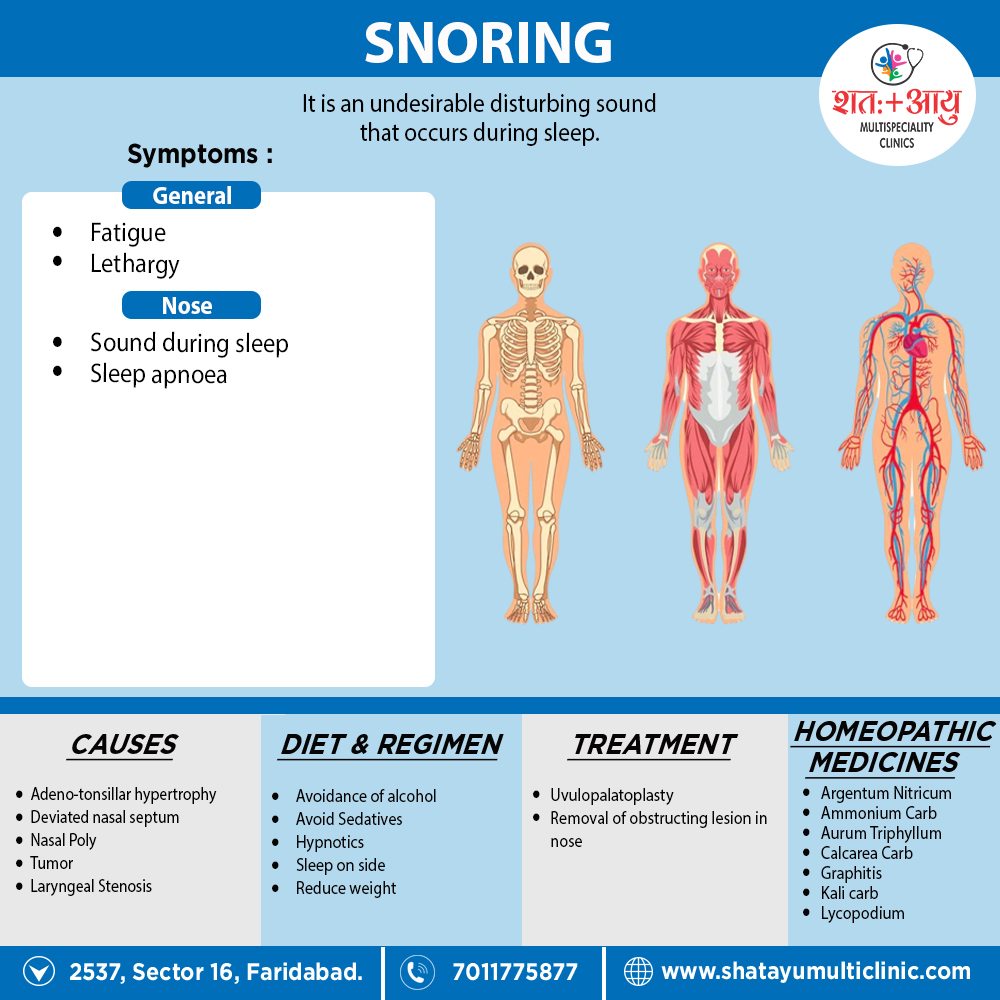Homoeopathic Treatment for Snoring
Homeopathy treats the person as a whole. It means that homeopathic treatment focuses on the patient as a person, as well as his pathological condition. The homeopathic medicines are selected after a full individualizing examination and case-analysis, which includes the medical history of the patient, physical and mental constitution, family history, presenting symptoms, underlying pathology, possible causative factors etc.
A miasmatic tendency (predisposition/susceptibility) is also often taken into account for the treatment of chronic conditions.
Homeopathy Doctor
A homeopathy doctor tries to treat more than just the presenting symptoms. The focus is usually on what caused the disease condition? Why ‘this patient’ is sick ‘this way’. The disease diagnosis is important but in homeopathy, the cause of disease is not just probed to the level of bacteria and viruses. Other factors like mental, emotional and physical stress that could predispose a person to illness are also looked for.
Now a days, even modern medicine also considers a large number of diseases as psychosomatic. The correct homeopathy remedy tries to correct this disease predisposition. The focus is not on curing the disease but to cure the person who is sick, to restore the health. If a disease pathology is not very advanced, homeopathy remedies do give a hope for cure but even in incurable cases, the quality of life can be greatly improved with homeopathic medicines.
Homeopathic medicines for Snoring
The homeopathic remedies (medicines) given below indicate the therapeutic affinity but this is not a complete and definite guide to the homeopathy treatment of this condition. The symptoms listed against each homeopathic remedy may not be directly related to this disease because in homeopathy general symptoms and constitutional indications are also taken into account for selecting a remedy.
Amm-c.—
*Stoppage of nose mostly at night; must breathe through mouth (Nux-v.). Without any cold. Starts up every time the child tries to go to sleep.
Argentum nitricum
Coryza at first dry, then moist, discharging thick, yellow, purulent mucus, mingled with clots to blood; chilliness, lachrymation, sneezing [3]
Arum Triphyllum
Profuse coryza, discharge burning and ichorous, making nostrils and lips sore; feverishness and hot, dried skin; child picks at his skin, even producing raw places
Calcarea Carb
Nose dry and of offensive smell, nostrils sore and ulcerated, discharge thick and pus-like, or thin and watery; moist during day and dry at night; enlargement of glands; profuse sweat, especially about head and feet; hoarseness; very susceptible to external influence, currents of air, cold, heat, noise, excitement.
Cham.
Nose runs, yet stuffed; one cheek red, the other pale; characteristic irritability. [3]
Graphites
Herpetic children, catching cold easily; dryness of nostrils, or alternate flowing and dryness; cracked also ulcerated nostrils; bloody mucus or thick foetid discharge; frequent sneezing. [3]
Kali Carb
Anemic children of cachectic appearance, with puffy swelling over upper eyelids, especially mornings; cannot breathe through nostrils in a warm room, (>) in open air; nostrils raw also bleeding; profuse, fetid, yellow-green discharge.[3]
Lycopodium
Dry from of chronic coryza, with much sneezing during the day and complete closure at night, so that child breathes with mouth open (Elaps) and protruding tongue; constipation, flatulency; coryza extending down air-passages; causing with loose expectoration; child starts out of sleep; rubbing its nose.
Nux-v
Coryza fluent during day; stopped at night; nose dry and stuffed; breathes through mouth. “Coryza prevents infants from breathing while nursing; worse especially at night and towards morning.”[3]
Samb.
“Child suddenly awakens nearly suffocated, sits up in bed and turns blue; grasps for breath, which it finally gets, then lies down again in bed, to be aroused again sooner or later by another spell.” “Nose perfectly dry and completely obstructed, preventing breathing also nursing; constant snuffles.” Child *inspires but cannot expire (Chlorine, Mephitis). Lastly, Edematous swelling in nose giving rise to snuffles.
Sticta.
Nose stuffed up. Constant need or inclination to blow nose, but nothing is discharged; excessive dryness of nose. (Tertiary syphilis.)

